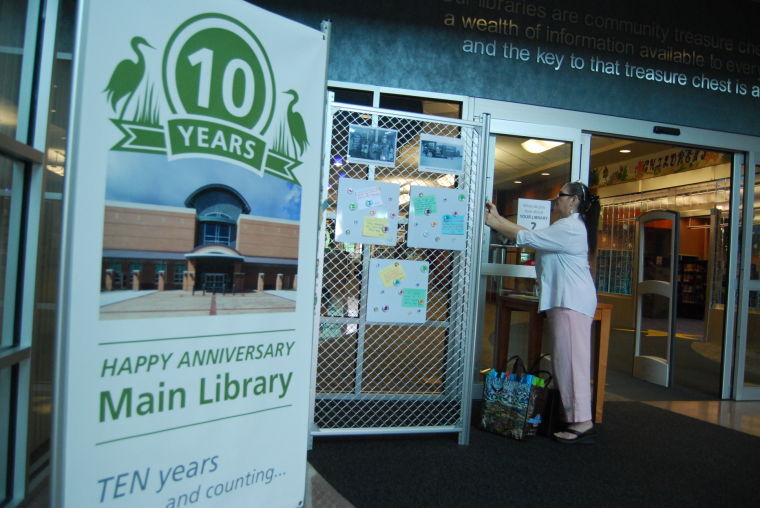
Which Craft aims to bring variety to local beer
April 16, 2013
WEB EXCLUSIVE: Boat blessings show an upbeat turn
April 16, 2013The enduring notion of libraries is that they’re archives of history and literature inseparable from the act of reading, lines of shelves that expand consciousness, but the institution’s modern role has swelled to encompass much more.
A decade after replacing the deteriorating status quo on Roussell Street with a $13 million facility in a nook between Barrow Street and La. Highway 311, the Terrebonne Parish Library System has been recognized among the national standard-bearers of that evolving responsibility in the era of no state aid.
“We can keep up with any library across the country,” pledged Mary Cosper LeBoeuf, director of the library system since 1995.
Three days before the main branch celebrates its 10th birthday on April 26, officials will learn whether the public system will receive a national medal for its service to the community. It is one of 16 finalists for one of five medals issued annually by Institute of Museum and Library Services, a federal agency.
“People of all ages seek out these institutions for opportunities to advance their education, to learn new skills for the 21st century, for cultural connections, and for civic engagement,” said IMLS Director Susan Hildreth of the finalists.
As technology continues to evolve, the chasm between some youth who won’t consume media unless it’s digital and those in the older generations who don’t yet grasp basic computer functions grows wider.
While ushering in digitized media in the form of e-books, magazine readers and a system-wide smartphone application, library officials haven’t neglected the computer illiterate. Of the 2,600 on-site programs the library hosts each year, dozens are workshops on the use of computers, from the beginning, beyond the basics and into email, Facebook and other special interests like photography and burning CDs. For those who, for a number of reasons, don’t have high-speed Internet access at home, the system offers more than 250 computers with that capability at its nine branches.
Balancing digitalization with techno-centric education is a readily obvious example of the mandate facing libraries across the country, but it’s only a fraction of what library officials peddle as their community service.
The system is credited with incubating Future Leaders of America’s Gulf, a group of 55 high-school students founded in 2010 that helps shape opinion of the region’s future and advocates on behalf of coastal issues. FLAG is lauded for breeding leadership and activism among the next generation.
In catering to all ages and socioeconomic classes, the library pioneered Reading Well and its offshoot, Reading Forever, outreach programs focusing on the young and the elderly, respectively.
Reading Well travels to 40 daycare centers and sees 1,400 children each month in an effort to help educate the young ones using relatable themes. Instructional material includes the alphabet, farm animals, poetry and more, such as the book “Hurrication,” written by library outreach manager Lillie Brunet. Brunet’s book, which she is attempting to have published, is meant to inspire children to view hurricane evacuations as novel vacations, as opposed to dwelling on fear while leaving behind their homes and belongings.
Reading Well features 300 different lessons, and each one is left at the early childhood centers for two weeks at a time so that educators can follow up on the lessons.
“We realized we have all these kids at daycare all day, if the parents are exhausted when they get home, who’s reading to them? Who’s exposing them to vocabulary, reading, attention spans?” LeBoeuf said. “We’ve been doing that for about eight years, and we have libraries across the country calling us and asking us how and why we do this and that.”
Reading Forever is a program devised from Reading Well’s success. The outreach staff visits assisted living and nursing home facilities twice a month to lead book discussions, arts and computer classes. Library staffers also deliver books to the centers.
“We’re really the heart of the town,” said associate librarian Judy Soniat, a New Orleans transplant who works in the reference department.
Tranquility, in a relative sense, was the theme last week as students mostly stayed home preparing for LEAP exams as opposed to the regular homework assignments that drive them to use the facility’s educational infrastructure. But that was short lived.
Saturday was the library’s 10th annual Jambalaya Writers’ Conference, keynoted by Pulitzer Prize finalist author Tim O’Brien. National Library Week lasts through April 20. The national medal announcement is three days later.
Perhaps all of this is pale when juxtaposed with the significance of April 26, which marks 10 years since the main branch opened its doors. It was the transition sparked by voters’ approval of a quarter-cent sales tax that made the lofty achievements possible.
“Since then, we have completely changed,” LeBoeuf said.
A time for reflection
One year prior to the sales-tax approval in 1998, the library system failed in its attempt to raise its property-tax collection from 3 to 10 mills. The 8,500-square-foot building at Roussell and Verret streets was cramped and underfunded, and the likelihood of improvement was bleak considering the system had but an $800,000 budget to divvy among nine branches.
“Most of the branches were built in the ‘60s, so we had no money for maintenance, no money for staff, no money to do programming or anything like that,” LeBoeuf said. “It was horrible; it was desolate for us. … We used to have a sign on the desk that said, ‘Do not ask us for pencils, paperclips, paper … we have no money.’ Honestly, we would bring stuff from home, the stuff we needed.”
Michel Claudet, elected as Terrebonne’s parish president in 2007 and 2011, played an indispensable role in transforming the library system into one of Terrebonne’s touchstone offerings, LeBoeuf said.
“The library was atrocious,” Claudet recalled. “It had literally gone to the dogs.” Using that line as a haunting slogan, Claudet and other community leaders spearheaded an effort to raise awareness of the problem and funds to help solve it – dog marches.
“We had this campaign with a dog march – not a parade, but a march – where they had placards that said ‘More money,’ ‘Longer hours,’ ‘More computers,’ things like that,” he said. “It focused the people of the community on the fact that we should be proud of our library, and if we want to be proud of it we need to go ahead and support it.”
One year after the main branch was completed, the Louisiana Library Association honored the system with its Library of the Year award.
“You knew your people,” circulation clerk Pam Harris, who worked at the downtown branch for one year before the switch, diplomatically remembered. A lack of space meant the clerks’ desk was immediately in front of the entrance, increasing the intimacy with the fewer people who used the free resource.
“We could fit the old building in here alone,” said clerk Renata Self of the library’s children’s department.
Roughly 1,000 diverse faces now frequent the 70,000-square-foot branch each day on average, according to library figures. The system, now with an approximately $4 million annual budget, has granted 93,000 “Knowledge Cards” to people who live or work in Terrebonne Parish.
Keeping up with technology and using it to accent the library’s offerings – the reference department may be revamped soon – will remain the system’s predominant goal. When the hubbub of a celebratory April subsides, the regular weekly programming, the day-to-day fruits of the system, will again take effect.
Clerks will read stories for children; professional musicians will exude messages of positivity; geography, science, history and artistry will be taught; contests in Bingo and dominoes will be waged. Adults will track down their ancestors in the expansive genealogy lab. A computer-illiterate retiree will learn how to use a search engine, how to copy and paste within a Microsoft word document. Knowledge will be shared and ascertained, and opportunities will be forged.
“We have tripled everything,” LeFoeuf said. “Minority usage has tripled, teen usage has tripled, the family unit … I’m so proud of Sundays because we see the family unit walk in together.”
As Terrebonne Parish continues to grow, the library system remains one of its premiere amenities.
“There have been industry leaders who have shared with me that they came into the community and were very skeptical about relocating over here because they didn’t feel they had all of the quality of life advantages in our community, as they may in others,” Claudet said. “After seeing our library and attending it, it wasn’t the final decision but it certainly helped them say they would come to Terrebonne Parish because I believe it showed the commitment our people have to make Terrebonne a better place.”
Locals, too, are continually struck by first impressions of the grandiose facility.
“It’s beautiful,” said Lauren Leonard, a 26-year-old from Thibodaux, after entering the facility for the first time. Leonard, who said she walked in to enjoy some quiet time before a lunch date, picked a magazine from the shelf and flipped through it to make a shopping list.













